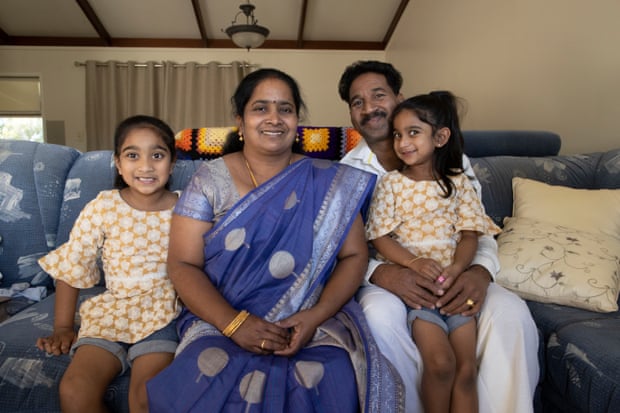
This family of Nades, Priya, Kopika and Tharnicaa Murugappan are well known to mainstream Australia as the ‘Biloela family’. They have captured our minds and our hearts ever since they were cruelly snatched away from their Queensland home by Australia Border Force and placed in immigration detention some four years ago. Their crime? For the parents to come to Australia by boat seeking asylum and, having settled into life in a small rural town, to be a day or two late in re-applying for a bridging visa.
The Federal Coalition government clearly wanted to make an example of this high profile family by deporting them to Sri Lanka and when this was foiled by the courts, to re-open the Christmas Island detention centre (at great cost to the taxpayers of Australia) just so it could house this one family. Adequate medical care was then denied to the youngest child who became seriously sick and had to be emergency airlifted to Perth Childrens Hospital. The family were then released into community detention until their ongoing court case could be resolved but barred from leaving Perth.
A change in government on 21 May saw a dramatic shift in the family’s fortunes. The new Labor government allowed them to return to Biloela last weekend and is making noises that they will be allowed to stay permanently. Their story is one of resilience and hope and the power of friendship and care provided by a dedicated group of women who advocated for the family’s return to Biloela. It is also a story of deliberate and calculated cruelty and lack of compassion by an Australian government more intent on the political benefit of ‘stopping the boats’ rather than providing any welcome or hospitality to refugees.
Refugee Week that runs 19-25 June gives us an opportunity to reflect on the turning point we may have reached in Australia’s asylum seeker policies. The Labor government has said that it will continue the policy of boat turnbacks when safe to do so and offshore processing (on Nauru) for any arrivals by boat, making their policy just as harsh as the previous government. But the treatment offered to the Nadesalingam family from Biloela offers a glimmer of hope that the large contingent of asylum seekers still living in limbo in Australia or stuck in detention will at least receive recognition and be treated as real people with stories to tell (often painful or traumatic) and hopes for their future.
May we remember Jesus’ call to treat others as we would have them treat us (Matt 7:12) and also that Mary, Joseph and baby Jesus were themselves refugees who relied on receiving hospitality in Egypt (Matt 2:13-15).
